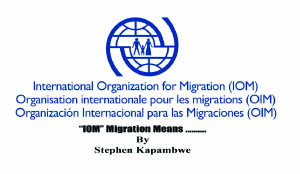 THE International Organisation for Migration (IOM) takes this opportunity to mark the end of 2014 with gratitude to governments and government agencies, partner organisations and stakeholders with whom positive achievements were made as regards improving lives of migrants.
THE International Organisation for Migration (IOM) takes this opportunity to mark the end of 2014 with gratitude to governments and government agencies, partner organisations and stakeholders with whom positive achievements were made as regards improving lives of migrants.
The IOM also takes this opportunity to mark the beginning of 2015 with optimism that achievements secured in 2014 would be built upon in an effort to ensure that the lives and human rights of migrants are protected and upheld respectively by host communities, governments and those charged with the responsibility of providing protection and other support services.
This is because as IOM Director General William Lacy Swing noted in his speech to mark International Migrants Day on December 8th, 2014, “migration is not only inevitable, but also necessary and desirable.”
With more and more people opting to migrate for various reasons, and with human traffickers taking advantage of this to lure many for their own profit, it is the IOM’s hops that more governments, government agencies, support services and stakeholders are going to work together in 2015 to ensure migrants have better lives in host communities and countries.
The IOM also hopes that countries will work together in 2015 to reduce the number of migrants losing lives during migration.
In his speech to commemorate International Migrants Day last December, Ambassador Swing appealed for urgent action to save the lives of migrants and stop smugglers from exploiting their desperation to extort huge sums of money.
The appeal was made in view of IOM data showing that the number of migrants dying on dangerous journeys in the hope of finding better lives for themselves and their families is rising.
Ambassador Swing listed three priorities to protect vulnerable migrants and reduce the number of deaths: saving lives; addressing the drivers of irregular migration; and partnering for effective action.
“All States have the international obligation to save the lives of those seeking help. Rescue operations should continue in the international waters of the Mediterranean. The current operation, Triton, while laudable, covers too small an area,” Ambassador Swing noted.
The IOM hopes 2015 presents yet another opportunity to build on all those areas that are supposed to make migration safe and productive and rights and human rights of migrants respected and upheld.
2015 also presents an opportunity for nations to work together in safeguarding the health of both migrants and host communities.
This is especially important as the world tackles the problem of the Ebola virus outbreak which has decimated lives in some countries in West Africa as well as in the Democratic Republic of Congo (DRC).
The effectiveness with which countries have tried to stop the Ebola virus from spreading by coordinating monitoring and health support services across national and international borders, as well as in working with the Word Health Organisation (WHO) in dealing with the Ebola threat to both migrants and host communities, has resulted in safeguarding lives of not only migrants but host populations as well.
The IOM hopes that in the same spirit, countries will coordinate efforts in monitoring and providing health and support services to both migrants and host populations to control communicable diseases like HIV/AIDS, sexually transmitted infections (STIs), and others in order to work towards attaining a disease free world.
The IOM also hopes that countries would strengthen their resolve to work towards combating armed conflicts and man-made causes of migration that result in displacement of populations. With 33.3 million people internally displaced and 16.7 million refugees, the number of people displaced by violence and conflict today in the world is the highest since World War ll.
In addition to that, an unprecedented number of man-made crises in the world, including in Syria, Iraq, Libya, the Central African Republic (CAR) and South Sudan; climate change and extreme weather events are all factors driving migration that must be addressed.
IOM wants to see better access to safe, regular migration. This includes promoting labour migration partnerships and family re-unification, providing clear information about the risks of irregular migration, and supporting community stabilisation and job creation efforts in countries of origin.
Today, migrants are engaged in many positive activities such as in fostering trade, helping to introduce new skills in host communities, managing businesses and other economic activities that help create jobs and better lives of host populations, and etcetera. They work in different fields like medicine, construction, education, agriculture and their expert knowledge helps improve lives of local people.
However, their efforts in many countries are not commended as they are treated with suspicion and exposed to negative vices like xenophobia.
Societies are ageing in the North, while in the South, young populations are growing. The rise of anti-migrant sentiment is a cruel irony at a time when ageing societies need migration to provide much-needed labour.
The IOM hopes the international community will in 2015 coordinate efforts to change the migration narrative to something more positive, focusing on what migrants contribute to their host countries, as well as their countries of origin, which benefit hugely from remittances they send home.






